Cape May County High School Students Attend Atlantic Cape Early College Program’s First Environmental Science Day
10/23/2023
| Media Contact: David Zuba, Public Relations Manager and Copywriter | (609) 343-4933

CAPE MAY POINT — Nearly 40 students, and their teachers, from Cape May County Technical High School and Lower Cape May High School attended the Atlantic Cape Community College Early College Program’s inaugural Environmental Science Day at the Cape May Point Science Center in Cape May Point on October 20.
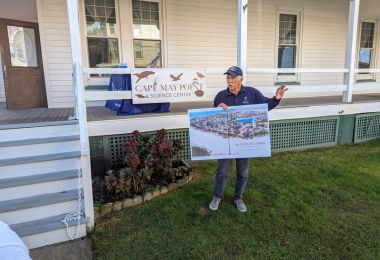 Science Center President Robert Mullock welcomed all during his initial remarks where he talked about the long and illustrious history of the property, the conservation and education efforts that the center is leading, as well as the types of land, air and sea life that permeate the Cape May Point environment. Atlantic Cape Science Department Chair Kenneth Cabarle, who accompanied his 200-level biology class on this day, greeted those in attendance as well during opening remarks.
Science Center President Robert Mullock welcomed all during his initial remarks where he talked about the long and illustrious history of the property, the conservation and education efforts that the center is leading, as well as the types of land, air and sea life that permeate the Cape May Point environment. Atlantic Cape Science Department Chair Kenneth Cabarle, who accompanied his 200-level biology class on this day, greeted those in attendance as well during opening remarks.
Atlantic Cape professors and Science Center staff members guided the students through various workshops.
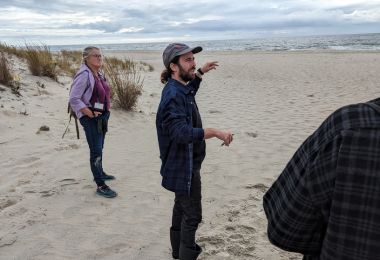 Assistant Professor of Environmental Science Richard Perello excitedly led his group of students down to the sandy beaches amidst crashing ocean waves to study the unique flora and fauna that thrive there, as well as the dozens of camouflaged ghost crabs that burrow holes in the sand and are practically unnoticeable to the distant naked eye.
Assistant Professor of Environmental Science Richard Perello excitedly led his group of students down to the sandy beaches amidst crashing ocean waves to study the unique flora and fauna that thrive there, as well as the dozens of camouflaged ghost crabs that burrow holes in the sand and are practically unnoticeable to the distant naked eye.
Assistant Professor of Biology Raymond Keller showed his groups of students the fascinating world of environmental microbiology under the powerful lenses of the microscope. Inquiring eyes got to peer into samples on glass slides to view all types of microscopic lifeforms. Cape May Point Science Center Director of Scientific Operations Dr. Sean Burcher discussed the reasons why researchers track wildlife for species conservation.
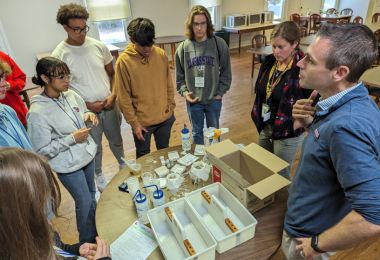 “The education that the students got today from seeing and hearing from the professors and scientists was awesome,” said Hannah Toft, natural sciences teacher at Cape May Tech. “We (teachers) always talk about these concepts in class, but for them (students) to actually do it hands-on, and to have microbiologists teach them about what’s in the sand and water was great.”
“The education that the students got today from seeing and hearing from the professors and scientists was awesome,” said Hannah Toft, natural sciences teacher at Cape May Tech. “We (teachers) always talk about these concepts in class, but for them (students) to actually do it hands-on, and to have microbiologists teach them about what’s in the sand and water was great.”
Professor of Astronomy and Earth Science David Jungblut and Professor of Science James Sacchinelli discussed the effects of, and presented a slideshow and live demonstrations on storm damage and coastal erosion, and how the two have played a significant role along the developed New Jersey coast.
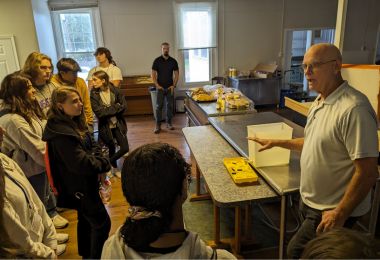 “As a geologist, I have always been interested in how the world works and today we have been trying to show these students the different dynamics and forces that are involved with our environment,” Jungblut said. “I hope the students today have learned that there are different ways to look at things and learn in science, and that earth science is the basis for everything and the forces, nature and biology are all related in some way to this Earth.”
“As a geologist, I have always been interested in how the world works and today we have been trying to show these students the different dynamics and forces that are involved with our environment,” Jungblut said. “I hope the students today have learned that there are different ways to look at things and learn in science, and that earth science is the basis for everything and the forces, nature and biology are all related in some way to this Earth.”
Toft was impressed how the presentations by professors Jungblut and Sacchinelli enlightened her students and allowed them to understand how these environmental dynamics affect those living near the shore.
“It was interesting to hear how erosion, sea level rise and all these storms affects people’s lives, not just from an environmental standpoint, but from insurance, claims and taxes,” Toft continued. “It was really cool to hear all those concepts be brought into it so that they (students) understand that our ecological health in Cape May County also affects our economic health.”
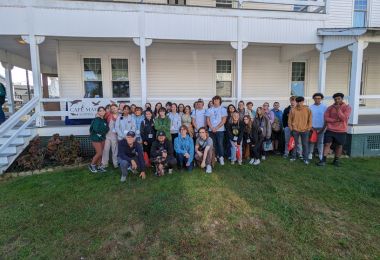 Several students from Cape Tech and Lower Cape May high schools discussed what topics interested them most.
Several students from Cape Tech and Lower Cape May high schools discussed what topics interested them most.
“I learned a lot today. I enjoyed cellular tracking and learning about the radio tags, what they operate on and how they are made,” said Cape May Tech High School junior Justin Walker, who would like to study biology at Liberty University after graduating. “I also learned a lot today about the dunes and how they work, and the natural flora and fauna too.”
Lower Cape May High School Senior Abigail Lagares, who wants to pursue nursing at Stockton University next year, was most impressed with her day at the Science Center.
“I thought everything was really good, really well organized, and very interactive and inclusive. They weren’t just speaking to one person in the room. They made sure they made contact with everybody by letting us ask questions and making us think deeper,” Lagares said.
Following the completion of the workshop sessions, the students were treated to a lunch complete with hoagies, chips, beverages and cookies for dessert before departing.
Atlantic Cape’s Early College Program partners with local high schools to provide students with the opportunity to earn college credit while enrolled in high school through options including dual credit, concurrent courses, articulated credit and associate pathways, which allow the student to earn college credits while shortening the time and cost it takes to earn an associate’s degree. Visit atlanticcape.edu/earlycollege to learn more.
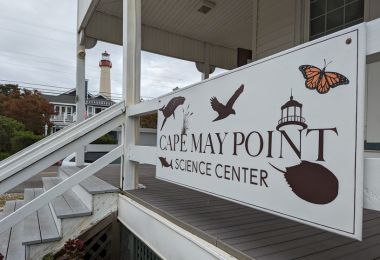 The Cape May Point Science Center stands today to accomplish its mission of protecting the environment, and the marine and avian species that rely upon the ecosystem surrounding the facility, which is located on the southern tip of Cape May where the Atlantic Ocean means the Delaware Bay just steps from the sea.
The Cape May Point Science Center stands today to accomplish its mission of protecting the environment, and the marine and avian species that rely upon the ecosystem surrounding the facility, which is located on the southern tip of Cape May where the Atlantic Ocean means the Delaware Bay just steps from the sea.
The Cape May Point Science Center has a lengthy history that dates back to 1889 when it opened as the Shoreham Hotel. Over the years it has been utilized as a home for the elderly, U.S. Army property during World War II and most recently, between 1909-2022, it was home to the Sisters of St. Joseph of Philadelphia, Saint Mary by the Sea Retreat. In March 2022, Mullock, who is also the President/Co-Founder of the Cape May National Golf Course, rescued the structure from potential demolition. Visit capemaypointsciencecenter.org to learn more.
About Atlantic Cape Community College
Atlantic Cape is a comprehensive two-year community college serving the residents of Atlantic and Cape May counties. The college offers over 40 career, transfer and workforce development programs to more than 8,000 students annually at three campuses in New Jersey: Atlantic City, Cape May Court House and Mays Landing.
